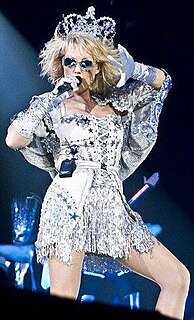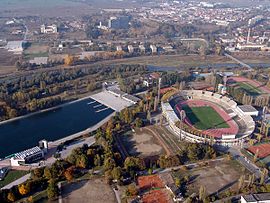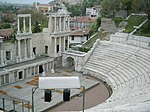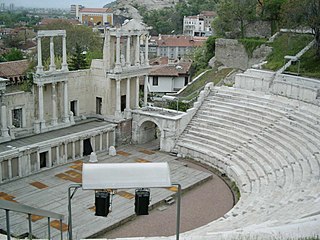This article does not cite any sources .(December 2009) (Learn how and when to remove this template message) |
Aerial view of the stadium. | |
| Location | Plovdiv, Bulgaria |
|---|---|
| Capacity | 55,000 |
| Construction | |
| Built | 1950 |
Plovdiv Stadium (Bulgarian : Стадион „Пловдив"), formerly known as 9th September Stadium (Bulgarian : "9-ти септември"), is a multi-purpose stadium in Plovdiv, Bulgaria. It is currently used mostly for athletics championships. The stadium holds 55,000. The stadium was built in 1950.

Bulgarian, is an Indo-European language and a member of the Southern branch of the Slavic language family.

Multi-purpose stadiums are a type of stadium designed to be easily used by multiple types of events. While any stadium could potentially host more than one type of sport or event, this concept usually refers to a specific design philosophy that stresses multifunctionality over specificity. It is used most commonly in Canada and the United States, where the two most popular outdoor team sports – football and baseball – require radically different facilities. Football uses a rectangular field, while baseball is played on a diamond and large outfield. This requires a particular design to accommodate both, usually an oval. While building stadiums in this way means that sports teams and governments can share costs, it also imposes some challenges.

Plovdiv is the second-largest city in Bulgaria, with a city population of 346 893 as of 2018 and 675,000 in the greater metropolitan area. It is an important economic, transport, cultural, and educational center. There is evidence of habitation in Plovdiv dating back to the 6th millennium BCE, when the first Neolithic settlements were established. It has been considered to be one of the oldest cities in the world; however, archaeological excavations in 2016 and 2017 have shown that this may not be the case.
The stadium initially had a capacity of about 30,000 spectators and had lights. Near the end of the 1980s a substantial renovation and expansion began, but was never finished due to the lack of funding. The stadium's present condition is dire, with no UEFA licence, no lights and only a few games played there (mostly junior teams). It is the only stadium in Bulgaria with two-storey stands. The biggest events held in the stadium were the 1990 Lepa Brena, 1999 Metallica concert and the Athletic World Championship for Juniors in 1990. Coordinates: 42°08′59″N24°43′11″E / 42.14972°N 24.71972°E

Fahreta Živojinović, known by her stage name Lepa Brena, is a pop-folk singer, actress, and talent manager. She is the best-selling female recording artist from the former Yugoslavia.

Metallica is an American heavy metal band. The band was formed in 1981 in Los Angeles, California by drummer Lars Ulrich and vocalist/guitarist James Hetfield, and has been based in San Francisco, California for most of its career. The group's fast tempos, instrumentals and aggressive musicianship made them one of the founding "big four" bands of thrash metal, alongside Megadeth, Anthrax and Slayer. Metallica's current lineup comprises founding members Hetfield and Ulrich, longtime lead guitarist Kirk Hammett and bassist Robert Trujillo. Guitarist Dave Mustaine and bassists Ron McGovney, Cliff Burton and Jason Newsted are former members of the band.

A geographic coordinate system is a coordinate system that enables every location on Earth to be specified by a set of numbers, letters or symbols. The coordinates are often chosen such that one of the numbers represents a vertical position and two or three of the numbers represent a horizontal position; alternatively, a geographic position may be expressed in a combined three-dimensional Cartesian vector. A common choice of coordinates is latitude, longitude and elevation. To specify a location on a plane requires a map projection.
| This article about a Bulgarian sports venue is a stub. You can help Wikipedia by expanding it. |






